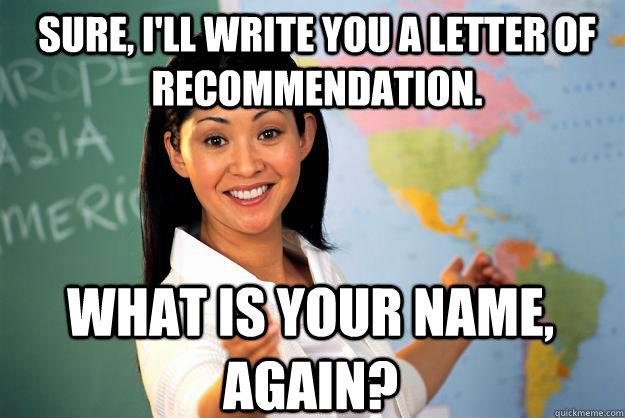
Letters of recommendation are important. From someone who’s worked in and around selection committees, let me tell you why!
For the sake of illustration, let’s say you’ve decided to apply to graduate school. Congrats, that’s an exciting choice! It’s time to assemble your application materials, making the case that the competitive program you’re applying for will choose you for its next cohort.
You’ll submit a transcript that summarizes your coursework and the grades you received. This shows the selection committee the depth and breadth of your study, and that you’re ready for the rigorous graduate-level courses that follow.
You’ll submit GRE or other standardized test scores- if your school requires them. Noteworthy that this is increasingly falling out of vogue due to systemic problems involved with standardized testing, but that’s a story for another day (eventual link to content).
You’ll submit a statement of purpose wherein you construct a narrative around your path of study, and show that you’ve researched about the school and are thinking about potential collaborations there. Whom do you want to work with, and why? How do you see yourself fitting into the lab/department? What excites you about the research, tools, of publications being done there? Don’t underestimate the amount of time you’ll need to submit a well-researched cohesive statement of interest that is tailored to each program of interest.
And, you’ll rely on letters of recommendations from a few people, too. In my experience, this is something students tend to spend the least amount of time on, but it’s so, so important. What your recommenders’ letters are doing is “vetting” you.
A selection committee commits to advise and mentor you for 1-10 years. What your recommenders speak to, and that other application materials can’t get at:
-What might it be like to share a physical office space with this person?
-How does this person communicate, handle conflict, and collaborate with others?
-How do you handle it when challenges come up? How do you handle it when someone gives you direction/criticism?
-How do you proceed when you’re given a project to work on independently?
-Do you have the potential to be a leader or mentor?
-Have you been trustworthy, loyal, and discreet with other people’s information and data?
In order for someone to speak to these facets of your personality and identity, you have to get to know them. This was a hard reality for me to accept as an introvert with social anxiety, but the good news is that today’s virtual environment makes things a bit easier. Everyone seems to be happy to Zoom with me.
From the time you arrive on campus, start talking to people who may be able to advocate for you. Professors, graduate students, teaching assistants, coaches, advisors, staff, community partners, and colleagues. If you don’t know how to start a conversation, start by asking questions; people are generally happy to talk to you about what they do and how they got there! Ideally, you’d know someone for a year or more before they write your recommendation letter, because they’ve known you in “each season” and have seem your growth and development.
People who write recommendation letters understand that the best letters are detailed and specific. When you’ve been around the block, you start to recognize the “generic” letters:” this person is conscientious and hard-working!” Probably so but, this doesn’t add anything that your transcript and CV doesn’t. It will not stand out in a pile of applications.
The worst letters of recommendations aren’t negative. They’re generic.
